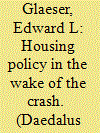| Srl | Item |
| 1 |
ID:
119204


|
|
|
|
|
| Publication |
2013.
|
| Summary/Abstract |
In this paper we develop a simple model with anchoring and loss aversion to explain house price dynamics. The model has two testable implications: 1) when both cognitive biases are present, price dispersion and trade volume are pro-cyclical; 2) if anchoring decreases with time, then price dispersion and trade volume are higher for transactions with a previous purchase that is more recent. Using a data set that contains most real estate transactions in Hong Kong from 1992 to 2006, we find anchoring and loss aversion to be important, and the results are robust to type of housing and sample period. The finding is consistent with the strong correlations among house price, price dispersion, and volume found in the data. Moreover, anchoring, price dispersion and volume decrease with time since previous transaction. Our results suggest that anchoring and loss aversion contribute to the cyclicality of the housing market.
|
|
|
|
|
|
|
|
|
|
|
|
|
|
|
|
| 2 |
ID:
099439


|
|
|
| 3 |
ID:
158546


|
|
|
|
|
| Summary/Abstract |
Housing filtering is well documented in the West, but few empirical studies have applied this concept in China. Under the framework of housing filtering, this study investigates how the fluctuation of the commodity housing market affects the housing opportunities of moderate- and low-income households in Ordos City, China. The findings reveal that the excessive commodity housing supply is not helping moderate- and low-income groups during the housing boom period due to skyrocketing housing prices and low housing availability caused by multiple homeownerships of the rich. The burst of the housing market bubble in 2011 has favored moderate- and low-income groups, manifested by their increased purchases in the secondary housing market under decreasing housing prices. Nonetheless, the poorest households still face financial difficulties in purchasing commodity housing. Moreover, majority transactions in the secondary housing market involve medium-sized dwellings, suggesting that the supply of medium-sized dwellings is critical in facilitating the filtering process in Ordos City. This research argues that government intervention is needed to ensure the housing opportunities of the lower income groups. However, it is beneficial to discuss how market mechanisms such as filtering can be made effective to promote housing opportunities for the poor.
|
|
|
|
|
|
|
|
|
|
|
|
|
|
|
|
| 4 |
ID:
156473


|
|
|
|
|
| Summary/Abstract |
The particularly overheated Chinese housing market, with its soaring property prices, has attracted a large amount of research. We point out three of its striking empirical features, which current literature leaves unexplored: co-existence of steady growth of real transaction price and excess supply, accelerations in price-to-income ratio, and significantly strong positive correlation between real transaction prices and income inequality. A search-equilibrium model is built to explain these facts. Heterogeneous buyers and homogeneous sellers randomly search for partners to trade in a frictional property market. The search equilibrium of the property market is either a high-price-and-low-transaction elitist matching equilibrium, or a low-price-and-high-transaction pooled matching equilibrium. The terms of trade determine which equilibrium arises. Empirical observations argue for the development of China's property market through evolution from a pooled matching equilibrium to an elitist matching equilibrium. We set out to show that the market equilibrium is always inefficient, due to crowding out externalities and market incompleteness. Policy experiments support redistributive tax, as a means to improve social welfare.
|
|
|
|
|
|
|
|
|
|
|
|
|
|
|
|